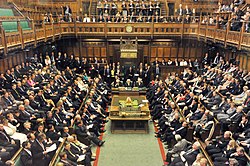 This week we have seen a load of MPs swearing in Parliament, and one in particular seems to have landed in hot water as a result. I am of course referring to the official “swearing in” ceremony for Parliament, and the MP that has gotten in trouble is Clive Lewis, Labour MP for Norwich South, who essentially took the oath under protest and was forced to re-swear because the wording wasn’t quite right the first time around. So what is this swearing in Parliament all about, and why is Clive Lewis generating controversy?
This week we have seen a load of MPs swearing in Parliament, and one in particular seems to have landed in hot water as a result. I am of course referring to the official “swearing in” ceremony for Parliament, and the MP that has gotten in trouble is Clive Lewis, Labour MP for Norwich South, who essentially took the oath under protest and was forced to re-swear because the wording wasn’t quite right the first time around. So what is this swearing in Parliament all about, and why is Clive Lewis generating controversy?
The Oath
Swearing in is a perfectly reasonable starting point for Parliament. In many situations we require an oath, most obviously when giving evidence in Court, but also when signing up to one of the branches of the military. In the case of the Court, the oath is to tell the truth, while with the military it is an oath to obey the chain of command right up to the monarch. In reality, all military decisions are made by Parliament or lower down the chain of command, so the reality of this is that the oath of allegiance is to Parliament wielding the power of the sovereign.
Members may choose to take a religious oath or make an affirmation, but the overall wording is very similar. The official wording for the affirmation is as follows:
Lewis’ Lapse
As already mentioned, Clive Lewis has been forced to re-swear the oath under threat of losing his seat if he doesn’t comply and potentially being subject to a financial fine. In addition, he would be unable to participate in the debates and votes that his constituents have elected him to Parliament to represent them in. One might be forgiven for assuming that there was some major failing in how Lewis acted up to this point to make that threat against an elected official justifiable.
Clive Lewis is a republican. He believes that the country would be better off without a monarchy, and on that point I agree based on the axiomatic principle of equality of opportunity. As such, he swore his oath with a preamble basically stating that he was a republican, hoped that he and his fellow MPs would be able to swear an oath to their country in future, but then proceeded to make the affirmation required of him.
Except that he missed the words “his heirs and successors”. Evidently someone in Parliament considered this enough of a lapse to make him repeat the oath with the correct wording under threat of not being allowed to represent his constituents otherwise.
There was then uproar from the monarchists in society, that he should not be allowed to be an MP at all because he clearly didn’t believe in the oath. This is an absurdity on so many levels.
Republican Representation
In the UK, the group of people who want to see the monarchy abolished are known as republicans. This is somewhat confusing when considering the people who normally come to mind when using the word “republicans”, but this is UK politics, not the US. At the moment, depending on how the questions are posed, upwards of 35% of the UK population are republicans, in that they either actively want to to see the monarchy abolished or they don’t see any reason why the monarchy should have an active role in UK politics any more.
Philosophically, it is fairly easy to see why such people exist. If we start with the principle that all people should be born with equality of opportunity, the idea of a hereditary position that cannot possibly pass to anyone else regardless of their merit is antithetical to the very concept of fairness. The flip side is that someone who doesn’t have to earn their position can have a more impartial impact on politics, in that they don’t have to consider whether people will approve of the necessary actions they have to take. This might have at least some merit if our monarch genuinely had an active role in everyday politics, but they don’t. The monarch has not actually wielded power over Parliament contrary to Parliament’s will in centuries, so in essences the role of monarch is that of a figurehead in practice.
A Problematic Practice
The problem is that this is not what the current oath does. In essence, the oath is a throwback to when Parliament really did serve solely at the whim of the monarch, and that monarch could directly intervene in Parliament and remove “traitors”. Now, Parliament is itself sovereign, the highest legislative body in the land, and we as citizens have a right to expect that our MPs – if they promise to do something – will either do it or make a real effort to do it.
This oath essentially says that they believe the monarch to be a higher authority than them, that they will obey commands from the monarch even when it contradicts the interests of the country or their constituents. There are plenty of people who say “it’s fine, they don’t really mean it” but that to me is incredibly dangerous. It is requiring that the first course of action for our MPs, those people that we trust to make rules in accordance with what they have promised to do when campaigning, make a promise that they fully intend to either ignore or break. The contempt this shows for the basic principle of honesty in our leadership should worry everyone, whether monarchist or republican.
A Wider Issue
Parliament has made some significant strides towards modernisation in recent years (though it still has a very long way to go), but this oath is one example of something that badly needs to be updated and yet has no means of doing so. After all, in order to replace the oath, Parliament would need to agree to replace it, which would mean that people who had sworn the oath to “be faithful and bear true allegiance” would need to decide that the next generation of MPs didn’t need to swear to be such, which would likely be considered a breach of the oath in itself. Frankly, this would be a constitutional mess, and one which can likely only be fixed by the monarch stating that the oath was no longer necessary.
In practice, this means that only republicans willing to lie can become MPs. A republican who becomes an MP will be forced to swear the oath of allegiance before being allowed to do their job, and presumably this forcing will not change their core beliefs. As such, they are forced to lie as their first official act.
It would be very easy to solve this. Parliament could easily amend its rules to allow new MPs to either swear an oath of allegiance to the monarch or attest their loyalty to the country and its citizens. This way, monarchist MPs could still swear allegiance to the hereditary monarch, while republican MPs could make what is in practice the same oath but without making it to someone they firmly believe has no place in UK politics.
